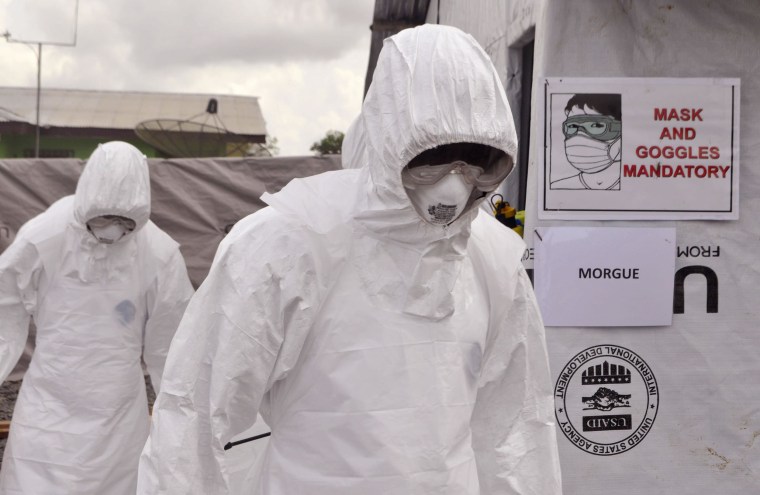More Americans who may have been exposed to the Ebola virus are being evacuated from Sierra Leone and will be quarantined near special isolation units, the Centers for Disease Control and Prevention said Saturday.
One American health careworker is currently being treated for Ebola at the National Institutes of Health outside Washington. NIH isn’t saying anything more about the patient, who was working in Sierra Leone.
But the nonprofit group Partners in Health said the patient was one of their staffers.
"A Partners In Health clinician working in Sierra Leone has tested positive for the Ebola virus. Our colleague remains in good spirits and has been transferred to the United States for treatment," the group said on its website.
CDC said Friday that another American who was in close contact with the patient would be evacuated and monitored for the 21-day incubation period for Ebola near Emory University Hospital, which has a special isolation unit.
Now there are more.
“Currently, none of these individuals have been identified as having Ebola virus disease."
“As a result of CDC's ongoing investigation, CDC and the State Department are facilitating the return of additional American citizens who had potential exposure to the index patient or exposures similar to those that resulted in the infection of the index patient,” the agency said in a statement.
“Currently, none of these individuals have been identified as having Ebola virus disease,” it added.
They’ll go for quarantine near one of three specially outfitted isolation units where Ebola patients have been treated.
“Individuals will be transported to the U.S. by non-commercial air transport and will be near the University of Nebraska Medical Center, the National Institutes of Health, or Emory University Hospital,” CDC said.
Nebraska Medical Center said it was preparing to receive four people.
"These people have been exposed to the virus but they aren't sick and aren't contagious," Dr. Phil Smith, who directs the center's bicontainment unit, said in a statement.
"In the unlikely instance that one of them does develop symptoms, we would take them to the Biocontainment Unit immediate for evaluation and treatment."
Doctors who have treated Ebola patients say the quicker they get medical care, the more likely they are to survive.
“Individuals will follow CDC’s recommended monitoring and movement guidelines, including direct active monitoring and, as appropriate, voluntary self isolation during the 21-day incubation period. In the event an individual shows symptoms, they will be transported following protocol to an Ebola treatment center for evaluation and care.”
“Individuals will be transported to the U.S. by non-commercial air transport and will be near the University of Nebraska Medical Center, the National Institutes of Health, or Emory University Hospital."
Ebola is still spreading in Sierra Leone and Guinea. No new cases have been counted in Liberia in a week, but officials say it’s too soon to declare the country free of the virus.
Ebola’s killed more than 10,000 people in West Africa since the epidemic started a year ago, and infected 24,000.
CDC teams have been in Sierra Leone helping to set up a trial of a vaccine to prevent Ebola. They’ve been in West Africa for months helping local health officials work to control the epidemic.
Partners in Health said it has 2,000 employees working in West Africa, including 600 Ebola survivors and 100 expatriate clinicians.
Health care workers such as doctors and nurses are at especially high risk of catching Ebola, which is spread in bodily fluids. More than 800 have been infected in West Africa and more than 400 of the have died.
